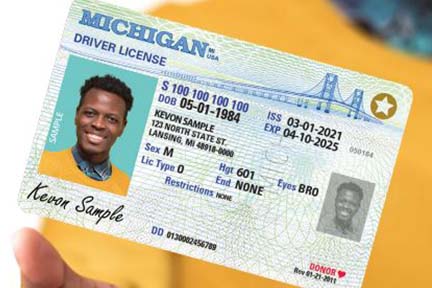
AG Releases Statement on the Passing of Pope Francis
|
|
|

|
|
|

|
|


FOR IMMEDIATE RELEASE: April 16, 2025 Contact: press@michigan.gov
Gov. Whitmer Launches $1 Million “Ticket to Tuition” FAFSA Sweepstakes FAFSA filers can enter for a chance to win one of forty $10,000 prizes or one of ten $50,000 prizes
LANSING, Mich. – Today, Governor Whitmer and the Michigan College Access Network (MCAN) announced the Ticket to Tuition sweepstakes at Lansing’s Eastern High School. Ticket to Tuition is a statewide initiative to encourage Michiganders enrolling in college for the first time, especially high school seniors, to complete the Free Application for Federal Student Aid (FAFSA) to lower the cost of college through valuable financial aid opportunities such as the Michigan Achievement Scholarship and Community College Guarantee.
“Filling out your FAFSA can help you save thousands of dollars on your education and with today’s sweepstakes, you can also enter to win up to $50,000 for your education expenses,” said Governor Whitmer. “Since I took office, we have made record, bipartisan investments to drive down the cost of earning a degree or skills certificate, and I’m proud that a majority of graduating seniors are now eligible to lower or completely eliminate their college tuition. As we continue working together to save Michiganders money, I encourage all high school seniors who want to go to community, private, or public college to fill out their FAFSA, save thousands of dollars while attending school, and enter to win our sweepstakes!”
“Filling out your FAFSA can help you punch your ticket to a college degree, a skills training certificate, more opportunity, and a better life,” said Lt. Governor Garlin Gilchrist II. “The ‘Ticket to Tuition’ sweepstakes will help more Michiganders get the skills they need to support their families at good-paying jobs. Let’s keep Standing Tall so every student can ‘make it’ in Michigan.”
Contest Details: To enter the Ticket to Tuition sweepstakes, complete the FAFSA and text CASH to 855-50K-TICKET by 11:59 p.m. Friday, May 16, 2025. To be eligible, participants must be Michigan residents who completed the FAFSA for the first-time to use during the 2025-26 academic year.
Prizes will be awarded in Michigan Education Savings Program accounts, which can be used for a variety of qualified educational expenses such as tuition and fees, living expenses, and computers and textbooks. Forty winners will receive $10,000 and ten winners will receive $50,000. For full contest details, visit TicketToTuition.com.
MiLEAP is proud to partner with MCAN to help provide resources, programming and support for students to pursue their educational and career goals.
“The new streamlined FAFSA can open scholarship and grant opportunities like the Michigan Achievement Scholarship and Community College Guarantee, providing students an affordable path to a postsecondary credential,” said Dr. Beverly Walker-Griffea, director of MiLEAP. “With Ticket to Tuition, we are encouraging students to complete their FAFSA by offering tens of thousands of dollars in prizes, but the real prize is the degree or skill certificate that will help them achieve their goals for themselves and their families.”
“College and skills training are keys to economic prosperity, which is why state financial aid opportunities such as the Michigan Achievement Scholarship and the Community College Guarantee are vital to Michigan families,” said Sen. Sean McCann. “It is critical that we do all we can to encourage students to complete the FAFSA and understand the financial aid they have earned through their academic careers so they can make informed decisions about their future.” “Michigan College Access Network is committed to increasing the number of students who access and complete college, and the Ticket to Tuition Sweepstakes is another way we are working to incentivize more students to explore postsecondary options,” said Ryan Fewins-Bliss, executive director of the Michigan College Access Network. “We want graduating seniors and their families to know that the FAFSA is the key to unlocking federal, state, and institutional financial aid, and now, completing it can give them the chance to win up to $50,000 to help with their future educational expenses.”
“Now more than ever, it’s crucial to make college and postsecondary opportunities accessible for young people,” said Ben Shuldiner, superintendent of Lansing Schools. “Programs like the Michigan Achievement Scholarship and Community College Guarantee have made career training more affordable—but completing the FAFSA remains the most important step. That’s what makes the Ticket to Tuition sweepstakes so exciting.”
Since Governor Whitmer took office, she has worked with a bipartisan Legislature to lower the cost of college for over 120,000 students annually through meaningful investments in state student financial aid including:
Students and families can complete the FAFSA online by visiting FAFSA.gov or by submitting a paper form. Recent updates to the application include reducing the number of questions to 36 from the previous 108, allowing for a more streamlined process. Most students and families can complete the application in less than 15 minutes.
|


FOR IMMEDIATE RELEASE April 15, 2025 Contact: press@michigan.gov Gov. Whitmer Reminds Michigan Families to Take Advantage of Tax Savings Programs, Putting Thousands of Dollars on Average Back in People’s Pockets April 15 is the deadline to file state and federal income tax returns in the U.S. LANSING, Mich. – Today, Governor Gretchen Whitmer encouraged eligible Michiganders to claim both the federal and state Earned Income Tax Credit (EITC), also known as the Working Families Tax Credit, when filing their 2024 individual income tax returns. By signing legislation to quintuple Michigan’s state match of the federal EITC in 2023, Michiganders can get an average federal and state refund of $3,200. Additionally, she rolled back Michigan’s retirement tax, saving thousands of senior households an average of $1,000 on their taxes this year when fully phased in. “For too long, working families have paid more on taxes than they should,” said Governor Whitmer. “That’s why I rolled back the retirement tax and quintupled the Working Families Tax Credit, saving hundreds of thousands of Michiganders money on their taxes. By putting more money back in Michiganders’ pockets, more families can afford college for their kids, pay the bills, or save for a rainy day. I’ll keep working with anyone who is serious about lowering costs and making sure people can make it in Michigan.” “Tax time is the best time for Michiganders to get more money back in their pockets,” said Lt. Governor Garlin Gilchrist II. “Thanks to our actions to roll back the retirement tax and expand the Working Families Tax Credit, Michiganders can get more money back this tax season. We’ll keep working to lower costs for Michiganders and Stand Tall so everyone can ‘make it’ in Michigan.” “Michiganders should file their state individual income tax returns or request an extension before the April 15 deadline,” said state Treasurer Rachael Eubanks. “Even if you don’t typically file a tax return, I encourage you to do so to take advantage of tax credits and other benefits. Please seek out assistance from a reputable tax preparer or electronically file to ensure you receive all eligible benefits.” Working Families Tax Credit In 2023, Governor Whitmer signed legislation to quintuple the Earned Income Tax Credit (EITC) for working families. This year, 650,000 families—home to half the kids in Michigan— will get an average combined federal and state tax refund of $3,200. To qualify, individuals must meet certain federal requirements and file a federal income tax return, even if no tax is owed or there is no requirement to file. If a federal credit is granted, the state of Michigan will provide an additional 30% credit when the taxpayer files their state income tax return. Taxpayers are encouraged to check to see if they are eligible. Both federal and state tax credits reduce the amount of tax owed and may provide a refund. Retirement Tax Rollback In 2023, Governor Whitmer signed legislation to rollback the retirement tax. Since then, she has continued this rollback, saving hundreds of thousands of senior households an average of $1,000 on their taxes. Over a four-year phase-in, state law restores the pre-2012 retirement and pension subtraction for most taxpayers in Michigan. This change benefits retirees in Michigan while ensuring taxpayers in unique circumstances are not harmed. For qualifications and guidance, visit Treasury’s Retirement and Pension Estimator. This resource can help individuals determine the eligible deduction or subtraction with the greatest value. Need filing help? Taxpayers are encouraged to consult a qualified tax preparer and explore the tax benefits available for their situation. Individuals with low to moderate income, disabilities or who are 60 years of age or older may qualify for free tax preparation help from IRS-certified volunteers. For information about free tax help, go to irs.treasury.gov/freetaxprep or dial 2-1-1. Additional free or low-cost tax help can be found at michiganfreetaxhelp.org. Need an extension? Individual taxpayers who need additional time to file a return beyond the April 15 deadline can request an extension to Oct. 15, 2025. Taxpayers can request additional time to file by using MI Form 4, Instructions for Application for Extension of Time to File Michigan Tax Returns. Taxpayers requesting additional time to file should also estimate their tax liability and pay any taxes owed by April 15, 2025, to avoid additional interest and penalties. An extension to file is not an extension to pay. Taxpayers affected by the severe winter weather emergency in Northen Michigan can qualify for an extension after the April 15 deadline. Penalty and interest will be waived. Individuals have to contact Michigan’s Department of Treasury to determine the length of the extension.
|


FOR IMMEDIATE RELEASE April 14, 2025 Contact: press@michigan.gov
Gov. Whitmer Continues Housing Momentum Across State, Announces Developments in Albion, Hillsdale
LANSING, Mich. — Today, Governor Gretchen Whitmer announced two redevelopment projects have received support from the bipartisan Revitalization and Placemaking (RAP) program, which will see the rehabilitation of vacant buildings in Albion and Hillsdale to create commercial space and 11 total housing units. Together, the projects will generate a total capital investment of over $4.27 million, while also creating residential density and vibrancy in their downtown areas.
The RAP program provides access to gap financing for place-based infrastructure development and real estate rehabilitation and development.
“Support for these projects in Albion and Hillsdale underscores our commitment to our ‘Make It in Michigan’ economic development strategy’s focus on the people, places, and projects that are integral to growing Michigan’s economy,” said Governor Whitmer. “The RAP program helps to create vibrant places that attract and retain talent, add new housing options, enable business creation and attraction, and provide resources for our Michigan communities. Let’s keep working together to get things done for our state.”
“On behalf of the MEDC, we are pleased to work with communities across Michigan and invest in their resilience through the RAP program as part of our ‘Make It in Michigan’ economic strategy’s placemaking efforts,” said Michele Wildman, MEDC Chief Place Officer. “We look forward to seeing how these projects bring new residents and vibrancy to this south-central region of Michigan and enhance the downtown areas of Albion and Hillsdale.”
In Downtown Albion, husband and wife developer team Bill and Karen Dobbins will transform a vacant, functionally obsolete building into a vibrant three-story, mixed-use building. The Hayes Block project will create nine new residential units – including an ADA-accessible unit on the main floor – and two new retail spaces, adding to the residential density and vibrancy in Albion. The total anticipated capital investment for the project is $3,614,068.
The project is supported by a $1,325,000 RAP grant, as well as $310,283 in State Brownfield tax increment financing (TIF) to address the brownfield conditions on the property. The project will transform a long-vacant building in Albion’s Superior Street Commercial Historic District and create much-needed housing and modern commercial space. The Dobbins family has redeveloped several similar properties within Albion and leveraged support from the MEDC, including Community Development Block Grant funding for the Erie Street Apartments and The Peabody Building and a Michigan Community Revitalization Program grant and state brownfield TIF for the Brick Street Lofts project.
“Redeveloping The Hayes Block, in the heart of Albion is about more than bricks and mortar—it’s about breathing new life into our community,” said Joe Verbeke, manager of ACE Investment Properties. “With nine thoughtfully designed apartments, an elevator to ensure accessibility, and new commercial space to support local businesses, this project creates the kind of downtown energy that draws people in and keeps them connected. Projects like this don’t happen without visionary partners. The Michigan Economic Development Corporation has played a critical role in making this redevelopment a reality. We thank the MEDC for their unwavering support of Albion.”
“The City of Albion is grateful to the Michigan Economic Development Corporation for their continued investment in our community, and we extend our sincere appreciation to the Dobbins family for their vision and commitment to Albion’s downtown revitalization,” said Interim City Manager Doug Terry. “The Hayes Block project is a transformative step forward—bringing new housing and commercial opportunities right to the heart of our city. We are thrilled to see construction already underway and look forward to the energy and economic activity this development will bring to the entire City of Albion.”
“This grant is what happens when government prioritizes the needs of our downtowns,” said State Representative Steve Frisbie (R-Pennfield Township). “I am happy to see the MEDC contributing to building a stronger and more vibrant Albion, and I look forward to working together to find additional ways we can continue to grow our district’s infrastructure.” In Downtown Hillsdale, development team GSG Generations LLC will revitalize a functionally obsolete and underutilized building, known as the Engine House, to create a mixed-use building with two residential units and a retail space on the ground floor. The two residential apartments will consist of a one-bedroom, 714-square-foot apartment and a two-bedroom unit totaling approximately 1,105 square feet, while the ground floor will provide 1,409 square feet of white-boxed retail space. Supported by a $225,000 RAP grant, the Engine House project is expected to generate a total capital investment of $660,355. This project supports the City of Hillsdale’s goals to preserve an existing structure while increasing residential density and walkability in the downtown area. GSG Generations LLC is a family-owned development company with prior experience in rehabilitation and development projects in Hillsdale as well as surrounding areas, adding vibrancy to the local community.
“Our family has supported downtown Hillsdale and community library, commerce, and school collaborations continuously since arriving in Hilldale early last century,” said developer GSG Generations LLC. “We recognized the State of Michigan downtown renovation grant program as a tailor-made vehicle to overcome financial barriers preventing the rehabilitation of 37 McCollum. GSG was created for a rescue plan which only became practical with the help of MEDC, the City of Hillsdale, SBDC business consultant Mary Wolfram, Holden Branch, Paula Holtz and many others. We also thank Foulke Construction for their commitment to see the project through and H.J. Gelzer and Sons, Inc. for its stewardship of a historic building slated for demolition.”
“We’re incredibly excited to see new life breathed into 37 McCollum Street,” said City of Hillsdale’s Development Coordinator Sam Fry. “This project by GSG Generations, LLC, represents exactly the kind of investment we want to encourage—preserving the historic character of our downtown while creating new opportunities for both businesses and residents. Transforming a long-vacant building into vibrant commercial space and much-needed apartments is a big win for Hillsdale, and we’re grateful for GSG’s vision and commitment to our city’s future.” “This redevelopment project will help reenergize downtown Hillsdale — which benefits everyone in the community,” said State Senator Joseph Bellino (R-Monroe). “By assisting developers in revitalizing an existing building for both retail and residential use, this grant will help attract more economic activity and investment to Hillsdale and help make the downtown area a better place to live and visit.” “I’m very glad to see the state investing in my district,” said State Representative Jennifer Wortz (R-Quincy). “Many buildings in downtown Hillsdale have sat vacant and neglected for years or even decades, and the resulting poor conditions can make it difficult to get projects off the ground. This grant will help to minimize that burden, continuing Hillsdale’s status as a great place to live, work, and do business.” |


FOR IMMEDIATE RELEASE April 10, 2025 Contact: press@michigan.gov Governor Whitmer Makes Appointments to Boards and Commissions
LANSING, Mich. — Today, Governor Gretchen Whitmer announced appointments to the following boards and commissions: Mackinac Island State Park Commission; Michigan Veterans’ Trust Fund Board of Trustees; Michigan Veterans’ Memorial Park Commission; Michigan Domestic and Sexual Violence Prevention and Treatment Board; Child Lead Exposure Elimination Commission; Human Trafficking Health Advisory Board; Human Trafficking Commission; Regional Transit Authority Board of Directors; Michigan Arts and Culture Council; Michigan Trails Advisory Council; Child Abuse and Neglect Prevention Board; School Safety and Mental Health Commission; Early Childhood Investment Corporation Executive Committee; Michigan Public School Employees Retirement System Board; Certificate of Need Commission; Michigan Interagency Council on Homelessness; State Police Retirement Board; Michigan Soybean Committee; Board of Health and Safety Compliance and Appeals; Commission on Middle Eastern American Affairs; Public Health Advisory Council; Organized Retail Crime Advisory Board; Michigan Asparagus Advisory Board; and the Michigan Sentencing Commission.
Mackinac Island State Park Commission Marlee Brown, of Mackinac Island, is the co-owner of Arnold Freight and a professional artist. Brown holds a Bachelor of Arts in history and political science from the University of Michigan. Marlee Brown will be reappointed as a resident of Mackinac Island for a term commencing April 13, 2025, and expiring April 12, 2031.
Liz Boyd, of Lansing, is the principal at Liz Boyd Public Relations. Boyd holds a Bachelor of Arts in journalism and a Master of Arts in advertising from Michigan State University. Liz Boyd will be appointed as a Democrat for a term commencing April 13, 2025, and expiring April 12, 2031. Boyd succeeds Rachel Bendit, whose term is expiring.
The Mackinac Island State Park Commission was formed in 1895 and is responsible for all aspects of managing Mackinac State Historic Parks. The Commission retains and exercises its authority and responsibility for developing the mission, goals, policies, objectives and direction for the unique properties under its jurisdiction.
These appointments are subject to the advice and consent of the Senate.
Michigan Veterans’ Trust Fund Board of Trustees Paul McIvor, of Yale, is the former state commander of the Veterans of Foreign Wars, a former Yale city councilmember, and a retired teacher. During his enlistment, McIvor served as an engineer for the United States Army. Paul McIvor is reappointed as the representative of the Veterans of Foreign Wars for a term commencing April 10, 2025, and expiring February 25, 2028. Gregory Spight, of Detroit, is a maintenance coordinator at Corpus Christi Catholic Church in Detroit. Spight is also a Vietnam Veteran of the 1st Infantry Division and a member of the American Legion Department of Michigan, serving as First Vice Commander at Coleman A. Young Post 202. Spight attended Wayne County Community College and the University of Detroit Mercy. Gregory Spight is appointed as the representative of the American Legion for a term commencing April 10, 2025, and expiring February 25, 2028. Spight succeeds James Wallace, whose term has expired.
Ramiro “Ray” Lopez, of New Boston, is a former electrician at the Ford Motor Company. Lopez previously served as the Vetrans of Foreign Wars Department of Michigan state commander. Lopez holds an electrical certification from Henry Ford Community College. Romiro Lopez is appointed as an independent member who may or may not be a member of one or more congressionally chartered veteran’s organizations, but who shall not represent any congressionally chartered veteran’s organization of which they are a member for a term commencing April 10, 2025, and expiring February 25, 2026. Lopez succeeds Gregory Spight, whose term has expired. The Michigan Veterans’ Trust Fund was created in 1946 from $50 million in postwar reserve funds to provide grants for the emergency needs of veterans. The Michigan Veterans’ Trust Fund Board of Trustees governs grant policies and adjudication, county committee appointments, and expenditure from trust earnings. These appointments are not subject to the advice and consent of the Senate.
Michigan Veterans’ Memorial Park Commission Floyd Crawford, of Baraga, is a veteran of the United States Marine Corps and an on-call elder nutritional program driver for the Keweenaw Bay Indian Community. Floyd Crawford is appointed as a member of the general public for a term commencing April 10, 2025, and expiring December 18, 2026. Crawford succeeds Danny Craig, whose term has expired.
Gregory Havrilcsak, of Frankenmuth, is a lecturer on United States history, world civilizations, and the American military experience at the University of Michigan – Flint. Havrilcsak holds a Bachelor of Arts in history from the University of Michigan and a Master of Arts in history from Oakland University. Gregory Havrilcsak is reappointed as a member of the general public for a term commencing April 10, 2025, and expiring December 18, 2027.
Robert Price, of Pinckney, is a United States Army veteran and the former director of veteran outreach at the Michigan Department of Military Affairs. Price holds a Bachelor of Arts in criminal justice from Saginaw Valley State University and a Master of Arts in global organizational management from Ashford University. Robert Price is reappointed as a member of the general public for a term commencing April 10, 2025, and expiring December 18, 2027.
The Michigan Veterans’ Memorial Park Commission advises on the development, management, and maintenance of the Vietnam Veterans’ Memorial Park in Lansing, the operation of programs exclusive to the park, and the security services and enforcement of rules for the care and preservation of the park. These appointments are not subject to the advice and consent of the Senate.
Michigan Domestic and Sexual Violence Prevention and Treatment Board Judge Cynthia Ward, of Lansing, is a judge for the 54-A District Court in Ingham County. Judge Ward holds a Bachelor of Arts in economics from Rutgers University and a Juris Doctor from the Villanova School of Law. Judge Cynthia Ward is appointed as a member with experience in an area related to the problems of domestic or sexual violence for a term commencing April 10, 2025, and expiring December 4, 2027. Judge Ward succeeds Elizabeth Hines, whose term has expired.
Rebecca Shiemke, of Ann Arbor, is a managing attorney at the Michigan Advocacy Program and has worked for over thirty years as an attorney in the domestic violence field. Shiemke holds a Bachelor of Arts in sociology and women’s studies from Albion College and a Juris Doctor from Wayne State University Law School. Rebecca Shiemke is reappointed as a member with experience in an area related to the problems of domestic or sexual violence for a term commencing April 10, 2025, and expiring December 4, 2027.
The Michigan Domestic and Sexual Violence Prevention and Treatment Board coordinates and monitors programs and services for the prevention of domestic and sexual violence and the treatment of victims of domestic and sexual violence. The Board administers grants awarded under the Violence Against Women Act, the Family Violence Prevention and Services Act, and other governmental and non-governmental grants. These appointments are subject to the advice and consent of the Senate.
Child Lead Exposure Elimination Commission Diane McCloskey, of Detroit, is the executive director of CLEARCorps Detroit, a non-profit organization dedicated to lead poisoning prevention through its programs, education, outreach, and policy work. Diane McCloskey is appointed as a member representing an organization that focuses on lead exposure for a term commencing April 10, 2025, and expiring December 14, 2026. McCloskey succeeds Paul Haan, who has resigned.
The Child Lead Exposure Elimination Commission focuses on implementing the recommendations of the former Child Lead Poisoning Elimination Board and monitoring the state’s efforts to eliminate lead exposure in children. The Commission acts in an advisory capacity to the Governor and department director to coordinate and collaborate with all levels of government and stakeholders regarding programs and policies related to the elimination of child lead exposure. This appointment is not subject to the advice and consent of the Senate.
Human Trafficking Health Advisory Board Dashamir Pettway, of Dearborn, is the chief executive officer and founder of I Am Living LLC. Pettway holds an associate degree in social work from Macomb Community College. Dashamir Pettway is appointed as a human trafficking survivor for a term commencing April 10, 2025, and expiring December 31, 2028. Pettway succeeds Rodica Richmond, whose term has expired.
The Human Trafficking Health Advisory Board was established to collect and analyze information concerning medical and mental health services available to survivors of human trafficking, identify state, federal and local agencies that are involved with issues relating to human trafficking, and coordinate the dissemination of information concerning medical and mental health services available to survivors of human trafficking in this state. The Board may establish a program to improve public awareness of medical and mental health services available to survivors of human trafficking in this state. This appointment is not subject to the advice and consent of the Senate.
Human Trafficking Commission Leslie King, of Grand Rapids, is the founder and president of Sacred Beginnings Transitional Homes, which offers housing and support services for victims of human trafficking. King holds an associate degree in social work from Grand Rapids Community College. Leslie King is reappointed as an individual who has survived human trafficking for a term commencing April 10, 2025, and expiring March 1, 2027.
Hon. Lisa McCormick, of Dimondale, is the chief circuit judge pro tempore on the 30th Judicial Circuit Court in Ingham County. McCormick holds a Bachelor of Arts in legal studies from the University of Pittsburgh and a Juris Doctor from Thomas Cooley Law School. Lisa McCormick is reappointed as a circuit court judge who serves in a family court for a term commencing April 10, 2025, and expiring March 1, 2027.
The Human Trafficking Commission is designed to identify sources for grants that will assist in examining and countering human trafficking, fund research programs to determine the extent and nature of human trafficking in this state, and provide information and training to police officers, prosecutors, court personnel, social services personnel, and other individuals.
These appointments are not subject to the advice and consent of the Senate.
Regional Transit Authority Board of Directors David Massaron, of Detroit, is vice president of General Motors’ Infrastructure and Corporate Citizenship group. Previously, Massaron was General Motors’ chief economic development and real estate officer, senior vice president and chief financial officer at Wayne State University, and budget director for the State of Michigan. Additionally, Massaron serves on the boards of the Detroit Riverfront Conservancy, the Downtown Detroit Partnership, the Detroit Regional Partnership, and the Hudson Weber Foundation. Massaron holds a Bachelor of Arts in political theory and constitutional democracy from Michigan State University and a Juris Doctor from William and Mary Law School. David Massaron is reappointed as the governor’s representative for a term commencing April 10, 2025, and expiring March 31, 2028.
Regional Transit Authority Board of Directors’ mission is to manage and secure transportation resources that enhance mobility options, improve quality of life for residents, and increase economic viability in the region.
This appointment is not subject to the advice and consent of the Senate.
Michigan Arts and Culture Council Dr. Noel Jackson, of Trenton, is the president and founder of the Downriver Youth Performing Arts Center. Additionally, Jackson is a practicing dentist and the owner and founder of Jackson Snyder Parker Dental Practice. Jackson is also a member of the Rotary Club of Trenton, vice president of the Trenton Business Association, and a past member of the Trenton Educational Foundation board. Jackson holds a Bachelor of Arts in history from Michigan State University and a Doctor of Dental Surgery from the University of Detroit Dental School. Dr. Noel Jackson is appointed for a term commencing April 10, 2025, and expiring September 1, 2027. Jackson succeeds Robert Womack, whose term has expired.
The Michigan Arts and Culture Council serves to encourage, develop, and facilitate an enriched environment of creative and cultural activity in Michigan. The Council envisions a Michigan where every citizen celebrates the state’s cultural treasures and arts, and cultural experiences are accessible to all its citizens.
This appointment is not subject to the advice and consent of the Senate.
Michigan Trails Advisory Council Shannon Bessette, of Hastings, is the owner of three Michigan dealerships: US27 Motorsports, Capitol Harley-Davidson and Motorsports, and Battle Creek Harley Davidson. Bessette holds a Bachelor of Arts in political science, communication, and history from Aquinas College. Shannon Bessette is appointed to represent ORV and snowmobile owners for a term commencing April 10, 2025, and expiring January 17, 2029. Bessette succeeds Mark Losey, whose term has expired. The Michigan Trails Advisory Council was formed with the enactment of Public Act 451 of 1994. The purpose of the council is to advise the Department of Natural Resources and The Governor on the creation, development, operation, and maintenance of motorized and nonmotorized trails in the state, including snowmobile, biking, equestrian, hiking, offroad vehicle and skiing trails. This appointment is not subject to the advice and consent of the Senate.
Child Abuse and Neglect Prevention Board – “Children Trust Michigan” Chandra Madafferi, of Lansing, is the president of the Michigan Education Association. Madafferi holds a Bachelor of Science in special education, cognitive impairments, and therapeutic recreation from Central Michigan University and a Master of Education in special education from the University of Michigan Dearborn. Chandra Madafferi is appointed as a member representing organized labor for a term commencing April 10, 2025, and expiring December 19, 2027. Madafferi succeeds Paula Herbart, whose term has expired.
The Child Abuse and Neglect Prevention Board, also known as Children Trust Michigan, was established by the Michigan Legislature in 1982 and serves as a voice for Michigan’s children and families and promotes their health, safety, and welfare by funding effective local programs and services that prevent child abuse and neglect.
This appointment is subject to the advice and consent of the Senate.
School Safety and Mental Health Commission Dr. Daveda Colbert, of Farmington Hills, is the superintendent of the Wayne Regional Education Service Agency. Previously, Colbert was superintendent of Oak Park Schools and assistant superintendent for Detroit Public Schools. Colbert holds a Bachelor of Science in accounting and business administration from Southern University at New Orleans, a Master of Arts in teaching from Wayne State University, and a Doctor of Philosophy in education from Oakland University. Dr. Daveda Colbert is appointed as a member with a background in school administration for a term commencing April 10, 2025, and expiring April 9, 2029.
Dr. Alyse Ley, of Okemos, is the associate chair of education in the Michigan State University Department of Psychiatry and the director of Prevent to Protect, the Adolescent Targeted Violence Prevention Program at Michigan State University. Ley holds a Bachelor of Science in psychology, a Doctor of Osteopathy from Michigan State University, and completed her residency in child and adolescent psychiatry at the University of Michigan. Dr. Alyse Ley is appointed as a member with a background in school threat assessments for a term commencing April 10, 2025, and expiring April 9, 2029.
Dr. Nasuh Malas, of Ann Arbor, is the division director and service chief for child and adolescent psychiatry in the University of Michigan’s Department of Psychiatry. Malas holds appointments as a clinical associate professor in the Department of Psychiatry, where he is associate chair for child and adolescent psychiatry, and the in Department of Pediatrics at the University. Malas holds a Bachelor of Science in medical microbiology, Master of Public Health, and Doctor of Medicine from the University of Wisconsin. Dr. Nasuh Malas is appointed as a member with an experience in the provision of inpatient treatment to children under age 18 for a term commencing April 10, 2025, and expiring April 9, 2029. |